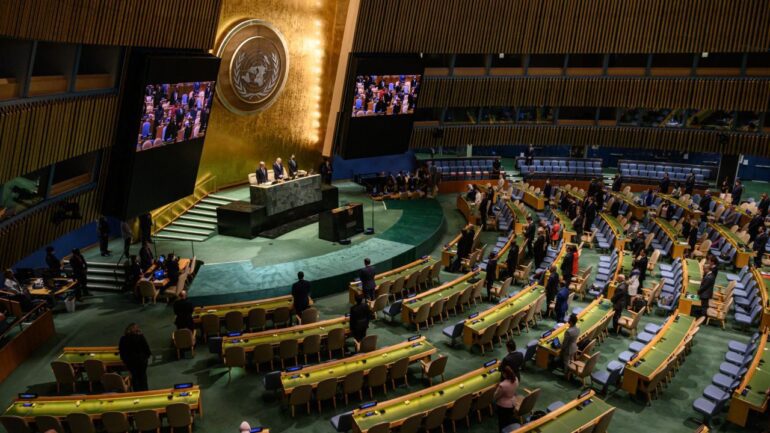TL;DR:
- The Commonwealth AI Consortium (CAIC) is convening during the United Nations General Assembly to advance AI’s role in sustainable development.
- CAIC, launched in 2023, focuses on ethical AI utilization in collaboration with tech giants, universities, and research institutions.
- The CAIC Steering Committee, led by Rwanda and co-chaired by NVIDIA, seeks to bridge digital and AI gaps with a focus on small states.
- Champion Countries within the CAIC include Rwanda, Antigua and Barbuda, Bangladesh, Gambia, Mauritius, and Trinidad and Tobago.
- The meeting aims to endorse a comprehensive AI action plan spanning research, policy, capacity building, and infrastructure, with a cross-cutting theme of youth and gender empowerment.
- Discussions will address global challenges and opportunities in sectors like healthcare, education, governance, climate change, and sustainable development.
- Outcomes will lay the groundwork for key deliverables leading up to the 2024 Commonwealth Heads of Government Meeting (CHOGM) in Samoa.
- The CAIC includes global organizations like NVIDIA, UC Berkeley, Microsoft, Deloitte, HP, DeepMind, and Digital Catapult UK.
- This collaborative approach aligns with the Physical Connectivity cluster’s work to bridge the digital divide in small states.
- The CAIC upholds Commonwealth Charter values, including recognizing small states’ needs, promoting youth involvement, gender equality, and sustainable development.
Main AI News:
In a forthcoming gathering set against the backdrop of the United Nations General Assembly sessions in New York, the Commonwealth Artificial Intelligence Consortium (CAIC) is poised to take a significant step forward in its mission to harness the transformative potential of artificial intelligence (AI) for sustainable development. Scheduled for September 18th, this meeting underscores the Commonwealth Secretariat’s comprehensive commitment to the ethical and responsible utilization of AI. Collaborating with global technology giants and world-renowned research institutions and universities, this holistic approach underscores the CAIC’s dedication to realizing the promise of AI.
Launched earlier this year, the CAIC is primed to execute the mandate outlined during the 2022 Commonwealth Heads of Government Meeting (CHOGM). This mandate revolves around equipping citizens with the essential skills required to fully leverage digital innovation and seize opportunities in the realm of cyberspace. Notably, as 2023 has been designated the Commonwealth Year of Youth, the CAIC will place a special emphasis on engaging the youth demographic, which constitutes a substantial 60 percent of the Commonwealth’s combined population.
Guided by the CAIC Steering Committee, with Rwanda at the helm and co-chaired by notable entities such as NVIDIA, the Commonwealth Secretariat, and the Commonwealth Scientific and Industrial Research Organisation (CSIRO), this consortium is determined to foster collaboration with private sector and research partners. The goal is to build upon the progress achieved during the Commonwealth Secretary-General’s visit to Silicon Valley in April 2023. During this visit, a consortium comprising global companies, startups, universities, and nonprofits was launched, all committed to working together to bridge the digital and AI divides and empower citizens, with a specific focus on small states.
The current membership of the CAIC Steering Committee boasts Champion Countries, including Rwanda, Antigua and Barbuda, Bangladesh, Gambia, Mauritius, and Trinidad and Tobago. In the words of Commonwealth Secretary-General, the Rt Hon Patricia Scotland KC, “It is a crucial but exciting time for the Commonwealth, as we look towards refining a clear vision and action plan to guide our approach to leveraging emerging technology for the benefit of all member nations and delivering meaningful and impactful outcomes. The creation of the CAIC, the establishment of a very committed Steering Committee, along with ongoing collaborations with tech partners and Research institutions, all signify the collective commitment to foster sustainable and inclusive AI advancements in the Commonwealth.”
The forthcoming meeting is poised to endorse a comprehensive AI action plan, seeking the support of Champion Countries for the implementation of AI in four pivotal areas: Research and Innovation, Policy, Capacity Building, and Infrastructure. Moreover, it will address cross-cutting themes such as Youth and Gender Empowerment, with a central focus on identifying high-impact projects for implementation across Commonwealth member states.
In addition to these critical deliberations, discussions will encompass pressing global challenges, explore national AI strategies, and unearth opportunities spanning various sectors, including healthcare, education, governance, climate change, and sustainable development. The outcomes of this meeting will lay the foundation for key deliverables leading up to the Commonwealth Heads of Government Meeting (CHOGM) scheduled for 2024 in Samoa.
Notably, the CAIC counts among its ranks world-leading organizations such as NVIDIA, the University of California (UC) Berkeley, Microsoft, Deloitte, HP, DeepMind, Digital Catapult UK, and the United Nations Satellite Centre. It also enjoys the participation of leading universities from across the Commonwealth. The CAIC is bolstered by the support of Australia’s National AI Centre, coordinated by CSIRO, the Bank of Mauritius, and Digital Affairs Malta.
This collaborative approach is seamlessly integrated into the ongoing work of the Physical Connectivity cluster, which is dedicated to leveraging digital infrastructure and bridging the digital divide in small states. Led by the Gambia, this cluster offers crucial support to Commonwealth countries in implementing the Agreed Principles on Sustainable Investment in Digital Infrastructure.
In alignment with the values and principles enshrined in the Commonwealth Charter, the CAIC is unwavering in its commitment to recognizing the unique needs of small states, championing the importance of young people within the Commonwealth, acknowledging the needs of vulnerable states, promoting gender equality, and advancing sustainable development. This convergence of vision and action holds the promise of a brighter and more inclusive future for all Commonwealth nations.
Conclusion:
The Commonwealth AI Consortium’s continued progress and commitment to leveraging AI for sustainable development demonstrate a growing emphasis on responsible AI use and digital innovation. This concerted effort involving global stakeholders and small states has the potential to reshape the AI market by fostering collaboration and addressing critical global challenges, ultimately leading to more inclusive and sustainable advancements in the field.

